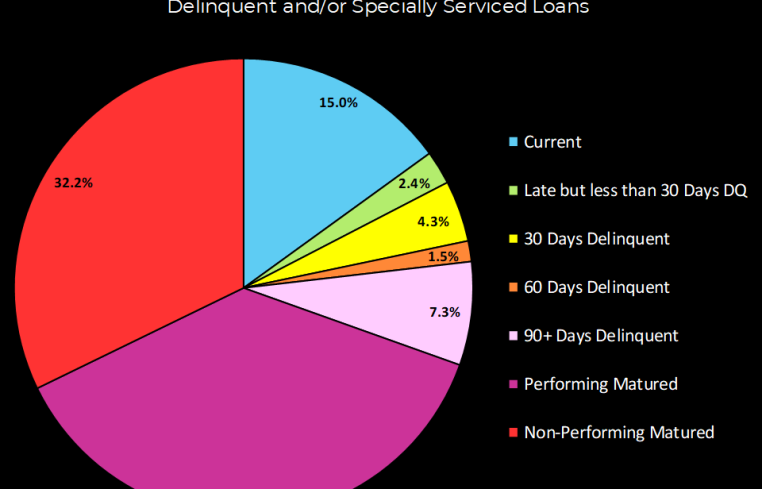CRE CLO Distress Rate Drops 160 Basis Points to 14.4%

The commercial real estate collateralized loan obligation (CRE CLO) market has been a critical financing vehicle for transitional assets, offering lenders flexibility and investors exposure to diversified real estate debt. However, as interest rates remain elevated and economic uncertainty lingers, the sector is experiencing notable shifts in loan performance. CRED iQ’s March 2025 report sheds light on delinquency and distress trends, providing valuable insights for commercial real estate professionals navigating this complex landscape.
CRED iQ’s distress rate for CRE CLO loans saw a meaningful improvement in March, dropping 160 basis points (bps) from 16 percent to 14.4 percent. This reduction reflects slight improvements across key metrics:
The delinquency rate fell 30 bps to 11.9 percent, signaling fewer loans falling 30-plus days behind on payments. The special servicing rate for CRE CLOs decreased from 9.4 percent to 8.5 percent, indicating a modest decline in loans requiring intensive oversight.
While these improvements are encouraging, the broader picture reveals ongoing challenges. A striking 69.5 percent of CRE CLO loans had surpassed their maturity dates, with 37.3 percent classified as “performing matured” — a 660-bp increase from the prior month. This surge suggests that many borrowers are exercising extension options or negotiating month-to-month arrangements to avoid default, particularly as rising interest rates and tighter capital markets complicate refinancing.
The payment status of CRE CLOs is a mixed bag. Only 15 percent of loans were current, down 530 bps from the previous month. This sharp decline underscores the pressure on borrowers to maintain timely payments amid higher debt service costs.
Nonperforming matured loans represented 32.2 percent of the CRE CLO portfolio, which was relatively stable with a slight 50-bp drop. Delinquent loans (pre-maturity) accounted for 15.4 percent of CRE CLO loans, a marginal improvement from 16.3 percent in February.
These figures reflect a market grappling with the aftermath of loans originated in 2021, when cap rates were compressed, valuations were elevated, and interest rates were historically low. Many of these loans, structured with floating rates and three-year terms, are now hitting maturity walls in a dramatically different economic environment.
Case study: The 1213 Walnut loan
A real-world example illustrates the pressures facing CRE CLO borrowers. The $125 million 1213 Walnut loan, backed by a 322-unit multifamily property in Philadelphia, highlights maturity-related challenges. Built in 2018 and valued at $151.4 million at underwriting, the property was 90.4 percent occupied as of March. However, its debt service coverage ratio of 0.64 signals financial strain, well below breakeven.
Originally set to mature in January 2023, the interest-only loan included two one-year extension options. Despite month-to-month extensions, it was flagged on the servicer’s watchlist and transitioned to nonperforming matured status in March 2025. This case underscores a broader trend: Even well-occupied properties can face distress when cash flows fail to cover rising debt service costs or when refinancing options remain scarce.
Looking ahead
While the 160-bp drop in the distress rate is a positive signal, the CRE CLO sector remains under pressure. The high percentage of matured loans and low share of current loans suggest challenges will persist, particularly for assets underwritten in the pre-2022 low-rate environment. Issuers like MF1, Arbor, LoanCore and Benefit Street Partners, which dominate the CRE CLO market, will need to navigate these headwinds carefully.
The data and insights in this blog are based on CRED iQ’s March 2025 report, analyzing $53.5 billion in active CRE CLO loans. Market conditions are subject to change, and professionals should consult primary sources and advisers for specific investment or lending decisions.
.
Mike Haas is the founder and CEO of CRED iQ.



